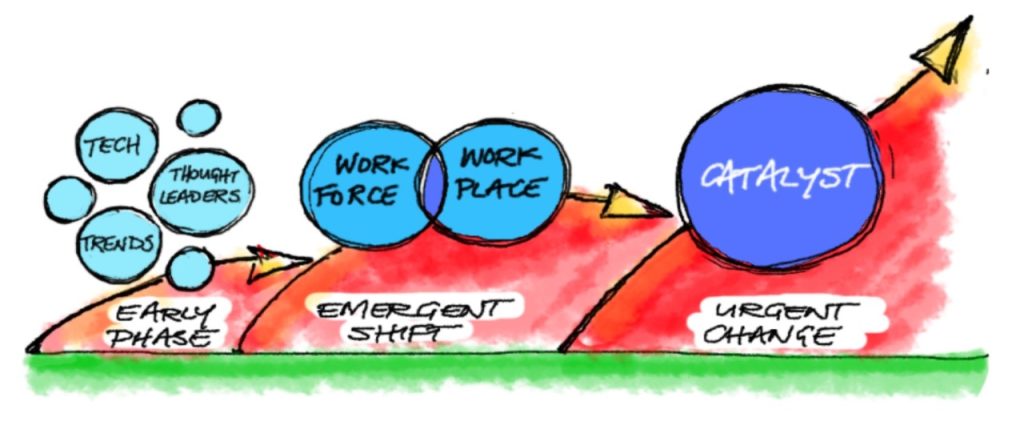How to lead the career development revolution
We need a national strategy on career development in Canada to capitalize on social shifts and respond to labour market needs
Lisa Taylor and Taryn Blanchard
 It’s an exciting time in Canada’s career development sector. Individual actors, organizations and projects are coming together. Awareness, expertise and commitment are coalescing. Focus is shifting from isolated activities to ambitious initiatives that emphasize co-ordination, amplify impact and prepare the sector for what comes next: a catalyst that ignites revolutionary change.
It’s an exciting time in Canada’s career development sector. Individual actors, organizations and projects are coming together. Awareness, expertise and commitment are coalescing. Focus is shifting from isolated activities to ambitious initiatives that emphasize co-ordination, amplify impact and prepare the sector for what comes next: a catalyst that ignites revolutionary change.
Challenge Factory and others are calling for a national strategy on career development in Canada. This call is urgent and essential if we want Canada to capitalize on social and economic shifts, to respond to labour market and employment needs and to seize on powerful opportunities for change when they arise.
Revolutions feel chaotic and disordered, but they also follow predictable patterns (Figure 1). In this article, we explore how the career development sector can shape its future in revolutionary times.

Signs of a career development revolution: Early phase
In quiet discussions among practitioners, it’s well known that the career development sector is undergoing significant disruption. COVID-19, social justice awareness, advancement in technologies and the role of post-secondary institutions in linking learning and work are all causing cracks in traditional careers work.
The early phase of revolutionary change is marked not only by disruption, but also by an abundance of innovation, study and analysis. Over time, these separate activities come to align in a variety of ways that push sectors and societies forward. Let’s take a look at four early phase activities.
“The early phase of revolutionary change is marked not only by disruption, but also by an abundance of innovation, study and analysis.”
International benchmarking: In February, the Organisation for Economic Cooperation and Development (OECD) released a major report on the state of adult career guidance in Canada that details the need to strengthen co-ordination of careers policy across the country, encourage greater and more inclusive use of adult career services and promote high-quality service provision.
 Dialogue and storytelling: Challenge Factory and CERIC are collaborating on a new Careers and Canadians webinar series that also focuses on the intersection of career development and public policy. Based on Retain and Gain: Career Management for the Public Sector, this series examines the personal career stories of senior policy leaders and where opportunity lies for a careers lens to inform policy development.
Dialogue and storytelling: Challenge Factory and CERIC are collaborating on a new Careers and Canadians webinar series that also focuses on the intersection of career development and public policy. Based on Retain and Gain: Career Management for the Public Sector, this series examines the personal career stories of senior policy leaders and where opportunity lies for a careers lens to inform policy development.
Professionalization: The Canadian Career Development Foundation (CCDF) is co-ordinating inclusive, sector-wide collaborative activities, including the renewal of practitioner standards and guidelines, the creation of a comprehensive competency model and the exploration of the feasibility of a professional institute.
Sector mapping: Efforts are under way to map the career development sector, including a project by CERIC and another from the Labour Market Information Council and Future Skills Centre. These projects aim to better understand career service providers across Canada, types of services being provided, client groups being served and the impact of these services.
These types of activities and information sources are important for building an evidence base that can be used to make informed decisions. To properly position the sector for revolutionary change, however, activities that look to learn from the past and understand the present will have a greater impact if they are also combined with activities that focus on anticipating what futures might be possible.
Recommendation: Stakeholders leading separate activities should recognize that our collective future is tied to working together. This is when true transformation will become possible. They should also start investing in future-focused tools and approaches, in the same way that they have invested in tools and approaches that research the past and present.
Getting organized: Emergent shift
In the second stage of revolutionary change, what we call the emergent shift, the importance of collective effort receives buy-in and everyone can see that a big moment is coming – but the conditions are not yet perfect for the catalyst that will set the full-scale revolution in motion. How do we ensure the sector is prepared to meet that big moment when it arrives?
Former Saskatchewan Deputy Minister Alastair MacFadden, the first guest in CERIC’s Careers and Canadians webinar series, notes that much of the sector is focused on optimizing the individual services provided to clients within current policy constraints. This includes advocating for better supports to reduce unemployment and faster access to training to fill skills gaps that are affecting the economy.
Read more
The skills-gap paradox
The thing we never talk about in career development
The future of work for the Black community
“We’ll really start to make headway when we flip our focus,” MacFadden says. “We need to develop programs and policy with a view to what they mean for individual careers. Rather than investing in training programs for displaced oil workers, for example, we need to create energy policy that has meaningful employment embedded within it as a key priority.”
Recommendation: The UN Sustainable Development Goals (SDGs) should be taken up as an organizing framework for the sector’s future-focused planning. We already see this happening in pockets and on an ad hoc basis. Full adoption will allow us to draw together isolated activities and align our workstreams in service of broader needs and opportunities, such as the green economy, social justice and global migration patterns.
Preparing for the catalyst: urgent change
We don’t yet know which spark will be the catalyst that truly starts the revolution in career development across Canada. But once that catalyst occurs, it will activate urgent change, the third stage in the revolutionary cycle, and we will be able to move forward into whatever the new world is going to be – if we don’t let the uncertainty of upheaval stop us.
Recommendation: Create a national strategy on career development that is realistic in its implementation and wildly aspirational in its intent and impact. A national strategy must change how we perceive ourselves, our work and our impact, while demonstrating strong ties to other areas of social progress (the SDGs). Working toward this national strategy will position and prepare us to recognize the catalyst moment, when it comes, and shape a future that benefits Canadians and the sector.
Developing a national strategy (on anything) is a monumental task in Canada’s federated, diverse environment. Yet there are tools and methods to bring everyone to the table, to set achievable expectations and to ride the wave of revolutionary change. Right now, we would start by asking a few deceptively simple questions:
- What are the historical drivers of change in the sector?
- What emerging issues are we excited, concerned or confused about?
- If we continue as we are, what are a few likely scenarios that might occur (given what we know about current and future trends related to employment, labour, productivity, wellness and competitiveness)?
- If we had a national strategy in place, what additional scenarios might emerge?
- Which of the scenarios outlined in questions 3 and 4 are worth exploring in more detail?
Knowing how to ask better questions and what to do with the responses is a critical skill. Done well, this effort will challenge us all to zoom out from our work today, identify the collective future we want and see that future so clearly we can’t help but take steps to make it happen.
It’s time for the career development sector to forge a path to better work, employment, engagement, well-being, prosperity and productivity for all. Blazing new trails is challenging work. But such is the nature of revolutionary change – and Challenge Factory is energized by the potential. Let’s get to work!
Lisa Taylor is a sought-after expert, speaker and columnist on today’s changing world of work. She is the President of Challenge Factory, a full member of the Association of Professional Futurists, an associate at the National Institute on Ageing, and co-author of The Talent Revolution: Longevity and the Future of Work.
Taryn Blanchard is the head of research at Challenge Factory and holds a PhD in Anthropology from the University of Toronto.

